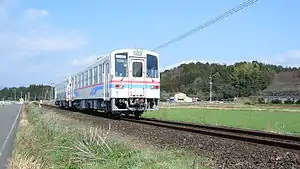Yunomae Line
The Yunomae Line (湯前線, Yunomae-sen) is a railway line in Kumamoto Prefecture, Japan, connecting Hitoyoshi-Onsen Station in Hitoyoshi and Yunomae Station in Yunomae. It is the only railway line operated by the third sector Kumagawa Railroad (くま川鉄道, Kumagawa Tetsudō). As the company name suggests, the line parallels the Kuma River. The company is also called Kumatetsu (くま鉄). The company took over the former JR Kyushu line in 1989.

History
The entire line was opened by the then Japanese Government Railways in 1924.
Freight services ceased beyond Taragi in 1974, and completely in 1980.
The third sector company took over the former JNR line in 1989.
On 6 July 2020, all services were suspended until further notice, due to severe damage caused by the rainfall, including the complete destruction of a large bridge over the Kuma River. In May 2021, it was officially announced that the line would be restored as a railway. Restoration work is estimated to cost around 4.6 billion yen, with the national government paying 97.5% of it, with the remaining 2.5% being paid by local governments.
Kumagawa Railway announced on 9 November 2021 the planned resumption of services starting from 28 November 2021 between Yunomae Station and Higo-Nishinomura Station. Trial runs will be conducted between 19 and 21 November, and training runs will be conducted between 22 and 27 November.[1] Services resumed between Yunomae Station and Higo-Nishinomura Station on 28 November 2021.
Basic data
- Distance: 24.8 km / 15.4 mi.
- Gauge: 1,067 mm (3 ft 6 in)
- Stations: 14
- Double-track line: None
- Electric supply: Not electrified
- Railway signalling
- Stations with passing loops: 1 (Asagiri Station)
Stations
| No. | Station | Japanese | Distance (km) |
Notes | Location | |
|---|---|---|---|---|---|---|
| 1 | Hitoyoshi-Onsen Station | 人吉温泉 | 0.0 | formerly Hitoyoshi Connection to JR Kyushu Hisatsu Line (Hitoyoshi Station) |
Hitoyoshi | Kumamoto |
| 2 | Sagarahan-Ganjōji Station | 相良藩願成寺 | 1.5 | formerly Higashi-Hitoyoshi | ||
| 3 | Kawamura Station | 川村 | 4.4 | Sagara | ||
| 4 | Higo-Nishinomura Station | 肥後西村 | 5.8 | Nishiki | ||
| 5 | Ichibu Station | 一武 | 9.2 | |||
| 6 | Kinoe Station | 木上 | 11.3 | |||
| 7 | Okadome-Kōfuku Station | おかどめ幸福 | 13.0 | Asagiri | ||
| 8 | Asagiri Station | あさぎり | 15.0 | formerly Menda | ||
| 9 | Higashi-Menda Station | 東免田 | 17.4 | |||
| 10 | Kōritsubyōinmae Station | 公立病院前 | 18.5 | Taragi | ||
| 11 | Taragi Station | 多良木 | 19.8 | |||
| 12 | Higashi-Taragi Station | 東多良木 | 21.7 | |||
| 13 | Shin-Tsuruba Station | 新鶴羽 | 23.3 | |||
| 14 | Yunomae Station | 湯前 | 24.8 | Yunomae | ||
Financial situation
The company's railway operations have not produced an operating profit since its creation in 1989, and in fiscal 2011, it had operating profit losses of 120.76 million yen.[2]
Rolling stock
As of June 2012, the company operates a fleet of eight diesel cars. With the exception of two tourist trains, these were scheduled to be replaced by five new diesel cars between fiscal 2013 and 2014. The new trains were designed by industrial designer Eiji Mitooka.[2] The new trains are now in service.
All five diesel cars were inundated at Hitoyoshi Onsen Station during torrential rains on 4 July 2020.[3]
References
This article incorporates material from the corresponding article in the Japanese Wikipedia
- くま川鉄道湯前線(肥後西村~湯前間)での試運転・訓練運転について(お知らせ) [Notice: Trial and Training Operation on Kumagawa Railway Yuzen Line (between Higo Nishimura and Yuzen)] (PDF). www.kumagawa-rail.com (in Japanese). Japan: Kumagawa Tetsudo. 9 November 2021. Archived from the original (PDF) on 12 November 2021. Retrieved 12 November 2021.
- 水戸岡さんデザイン最後の車両に? くま川鉄道 [Kumagawa Railroad - Last trains to be designed by Eiji Mitooka?]. Kumanichi.com (in Japanese). Japan: Kumamoto Nichinichi Shimbun. 28 June 2012. Archived from the original on 4 July 2012. Retrieved 29 June 2012.
- "Heavy rain halts Kumamoto railway, flooding trains". 6 July 2020. Archived from the original on 6 July 2020. Retrieved 6 July 2020.